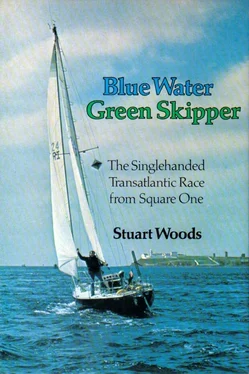The final dash
Sunday morning, the eighteenth, I picked up a Newport commercial radio station. I could not have been more excited if I had been contacted by a flying saucer. I could hear people talking, and they were in Newport, Rhode Island. What’s more, they were reporting race news. Five or six boats had finished during the last twenty-four hours, including Ziggy Puchalski and Richard Konklowski; another twenty-five boats still had not finished, so at least I wouldn’t be last.
I had a good lunch and stretched out on a settee berth for a nap. A few minutes later, as I was sleeping soundly, I was lifted right off the berth by the sound of a ship’s foghorn at what seemed a distance of about eighteen inches. I landed in the cockpit, ready to dive overboard and swim for it. There, about fifty yards off the port quarter, was a large merchant ship, Alchemist. I jumped below to get the loud-hailer, not wanting to use the tiny radio batteries unless absolutely necessary. I started to shout that I wanted to send a telegram, but she was already overtaking us. Someone on the bridge made a hand signal to indicate that they would circle. I tried to wave them off, remembering my close call with Olwen some weeks before, but they circled and came up again. I shouted out a telegram to Angela in Newport, giving an ETA of Tuesday, and asked for a position. But we were being overtaken again, and the big ship circled a second time. This time, the radio operator was standing on the foredeck, and as I shouted out my message, he sprinted toward the stern of his ship, writing furiously. Someone on the bridge had an old-fashioned hand megaphone and shouted a position to me. It struck me as funny that I, on my tiny boat, should have an excellent loud-hailer, while they, on their huge ship, should have a megaphone.
They sailed on, promising to dispatch my telegram immediately. My spirits soared now. My position had been reported, my navigation had proved to be perfect, and in two days I would be in Newport. I anticipated arriving between noon and three with the light winds we were experiencing. Then, only a few minutes after the disappearance of Alchemist, I looked off the port quarter and saw a yacht, the first I had seen since the English Channel. She was in the far distance, and even with the binoculars I could not recognize her, but I felt sure she was a competitor. She was there for the rest of the day, slowly overtaking us, and during the night she disappeared.
While I was watching her I saw something else in the water, a float of some kind, with a pole and a radar reflector. Then another, and another. This meant I would have to keep a lookout for fishing boats that night and the next, but also that they were using radar to find their floats, so would be likely to spot me, even though my reflector had slipped down to about six feet above the deck.
Darkness fell and I kept a close watch, sometimes lying down for ten minutes at a time to rest but not falling asleep. About two-thirty in the morning, as I was resting, I was suddenly overcome by a violent chill. Shaking uncontrollably, I got up to light the cabin heater but thought I would first have a look around. I stuck my head up through the hatch to find a large fishing boat two hundred yards dead ahead, bearing down on us at about ten knots. I grabbed a torch and signaled him, and he changed course to pass about twenty-five yards on our starboard side. The chill vanished. Had I developed another level of perception, like Bill King? Maybe.
Monday, July 19, our last day out. The wind backed and freshened, and we were tearing along at six knots under our reefing genoa and double-reefed main. My ETA began to change, and, for once, to earlier. We saw no shipping of any sort that day until sunset, when the first fishing boat appeared. At midnight, a huge, brightly lit ship, looking like an aircraft carrier, appeared on the horizon and tore across our wake several miles astern at very high speed.
We had now picked up Gay Head Light on Martha’s Vineyard to starboard, and Buzzard’s Bay Light was ahead, off the starboard bow. I kept a running check on our position with bearings from the two lights, combined with a check of our depth. At midnight I estimated we were fifteen miles from Brenton Reef Light and the finishing line, but I would not yet see it, even though it should have been visible at that distance. I hoped that one of the infamous local fogs was not enshrouding Newport — that was all I needed. I was taking great care to see that nothing went wrong this close to the finish. I kept thinking about Bill Howell in the last race, about to finish in fifth place, then colliding with a fishing boat. I didn’t want that sort of problem now. My ETA was now three a.m. I had not wanted to arrive at night in a strange port and I hoped I would be met at the finishing line, as had been mentioned at the pre-race briefing.
At twenty minutes past midnight I saw Brenton Reef Light flashing in the distance. I abandoned my compass course and began steering for the light, the first time in forty-five days I had had a mark to steer for. It was very satisfying. At 01.45, Judith Point Light appeared, and from bearings on the two lights I estimated my distance at seven miles. An hour later, I was almost on top of Brenton Reef Light and looking hard for the flashing red light on the buoy that marked the other end of the finishing line. I could see the lights of Newport arrayed behind the light.
I brought some flares, the signaling torch, and the loud-hailer into the cockpit. I didn’t want to waste a minute being found when I was across. The red buoy appeared where it was supposed to be.
On July 20, 1976, at 03.15 local time, 07.15 GMT, Golden Harp crossed the finishing line. The second we cleared the line I stood up on the afterdeck and struck a white flare. The yacht lit up as if a dozen klieg lights had been thrown on it. I had never seen such an intense, white light. The flare burned for about a minute, then sputtered out, leaving me with no night vision whatsoever. Gradually, my eyes became accustomed to the darkness again, and there was no boat of any kind to be seen. The wind was dropping very quickly, and Harp was slowing, now running dead before it at about two knots. I waited a few minutes and struck another flare. Again, the intense light, followed by equally intense darkness. Still no other boat.
Following the chart as best I could, we started up the narrow entrance to Naragansett Bay toward Newport. The lights of the town and of the large suspension bridge farther up the river made it very difficult to pick out buoys and lights ashore. The wind continued to drop and soon we were barely stemming the tide. We drew abeam of where Castle Hill Coast Guard station was marked on the chart. I could see a large building on a hill, with several exterior lights. I signaled the station, but there seemed to be no one on watch. (The building was a hotel. The Coast Guard station was behind the hill.) I tried the VHF but got no reply either from the Coast Guard or from Goat Island Marina, where a twenty-four-hour watch was being kept at a reception center being run by American Tobacco. Nothing. Maybe the small batteries were enough for receiving but not for transmitting. I struck another flare abeam of the Coast Guard station. Still no notice was taken of me.
I sat in the river for the rest of the night, fuming at being ignored. Forty-five days at sea and no bands, no fireworks, no dancing girls, not even a rowboat. The river was absolutely devoid of traffic of any kind.
These people did not seem to understand my heroic achievement. Did they think I did this every day? Shit.
Dawn came as slowly as possible. I made a cup of coffee and tried to stay awake until somebody else was up. I wondered what time the local water-skiers got started; there didn’t seem to be anybody else stirring. There was still not enough wind to make any headway against the tide.
Читать дальше












